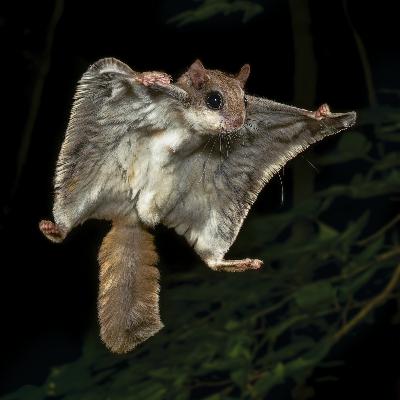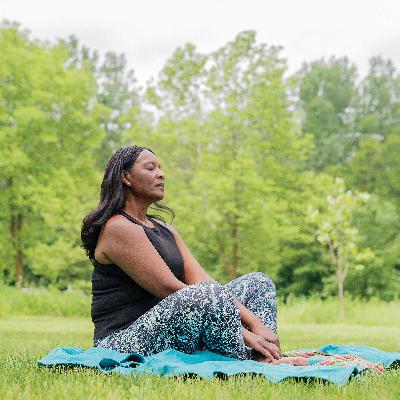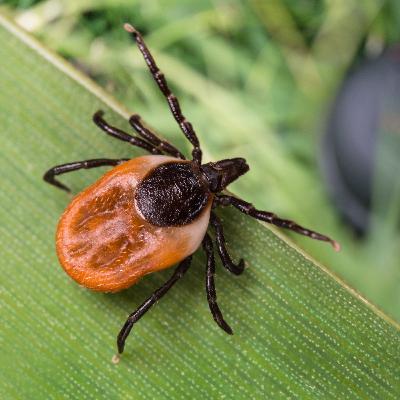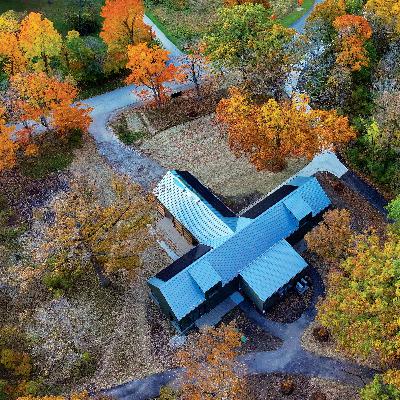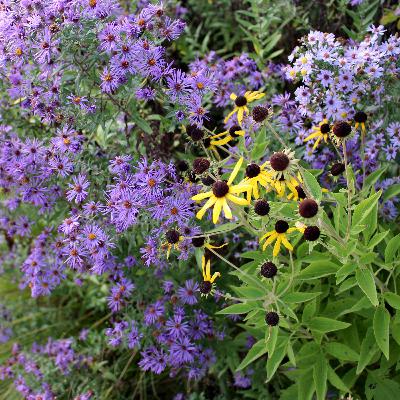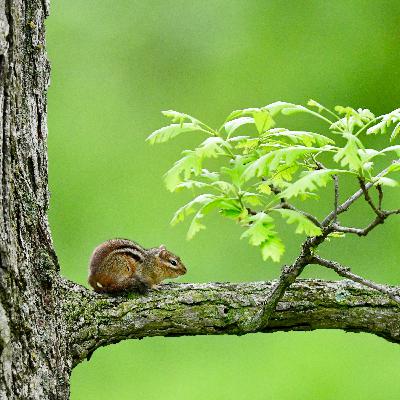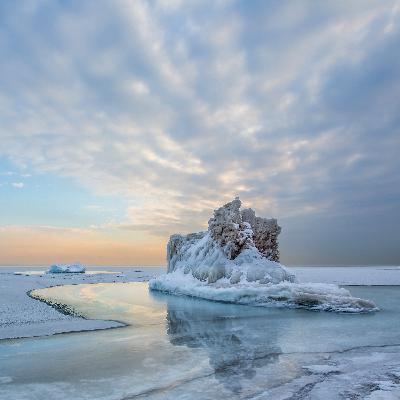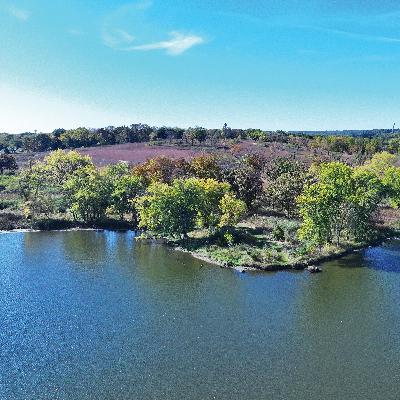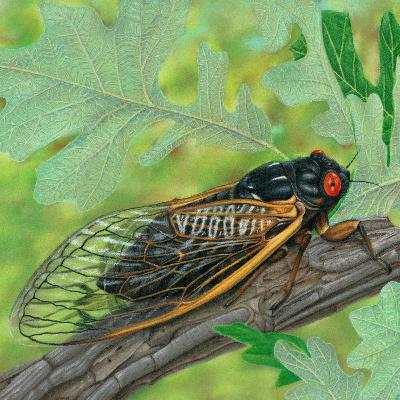Discover Words of the Woods
Words of the Woods

Words of the Woods
Author: Lake County Forest Preserves
Subscribed: 15Played: 96Subscribe
Share
© Lake County Forest Preserves
Description
Words of the Woods is a show about nature and history. Written and hosted by Brett Peto, environmental communications specialist at the Lake County Forest Preserves, it tells local stories about big topics. Season 3 focuses on climate change.
While it's a global issue, many of its effects—along with opportunities to help mitigate and prevent them—are local.
This season, Brett explores how climate change affects your forest preserves. How wildlife and plants may be adapting. And what the Forest Preserves is doing to make Lake County more climate-resilient.
While it's a global issue, many of its effects—along with opportunities to help mitigate and prevent them—are local.
This season, Brett explores how climate change affects your forest preserves. How wildlife and plants may be adapting. And what the Forest Preserves is doing to make Lake County more climate-resilient.
29 Episodes
Reverse
When you settle into bed for the evening, another world awakens. Flying squirrels launch between trees, bats emerge from roosts and owls begin their silent hunts. Your Lake County Forest Preserves provide the food, water, shelter and darkness these animals need during their night shifts. Despite their abundance and proximity, our nocturnal neighbors can seem mysterious. The dark obscures their unique activities. Let’s peek behind the curtain. Selected Links and Sources:“Bat Gardens & Houses,” Bat Conservation InternationalBats, Illinois Department of Natural Resources (IDNR)“Bats 101,” Bat Conservation International“Behind the bandit mask,” Lake County Nature BlogBlue-spotted salamander, IDNR“Chiroptera,” Animal Diversity WebCoyote, IDNR“DarkSky’s Home Outdoor Lighting Assessment,” DarkSky InternationalEastern tiger salamander, IDNR“Echolocation,” National Park ServiceEvery Acre StrongHorizons subscriptionsIllinois moths, IDNR“Night Shift: Lake County’s Nocturnal Animals,” Fall 2025 Horizons“Skunk stories,” Lake County Nature BlogSouthern flying squirrel, IDNR“The influence of human disturbance on wildlife nocturnality,” ScienceVirginia opossum, IDNRWhite-nose Syndrome Response TeamWhite-tailed deer, IDNR“Why do animals’ eyes glow in the dark?”, NPR *** If you like what the forest preserves do for you, please considerdonating to the Preservation Foundation’s Every Acre Strong campaign for the Forest Preserves. Your gift will help create a $20 million endowment to protect the forest preserves you love, ensuring every acre of habitat we restore remains ecologically healthy. Forever. Learn more and give at LCFPD.org/endowment. Subscribe to Horizons at LCFPD.org/horizons. Have questions or comments? Send them to WordsOfTheWoods@LCFPD.org. This episode of Words of the Woods was written, hosted and produced by Brett Peto, environmental communications specialist at the Lake County Forest Preserves. Featuring research and expertise from Jim Grego and Dan Sandacz. Scriptediting by Jeanna Martinucci, Kim Mikus and Rebekah Snyder. Music and sound effects from Storyblocks. Audio editing and mixing by Brett Peto. Episode cover art © Joe McDonald / McDonald Wildlife Photography.Words of the Woods is a production of the Lake County Forest Preserves in Libertyville, Illinois.
Imagine stepping into the woods, leaving behind the noise and stress of daily life. As you pause and breathe, a sense of calm takes over. There’s no rush or destination, only the soothing quiet of the woodland. Welcome to forest bathing, a practice that invites you to reconnect with yourself and nature. Forest Preserves Mentioned:Buffalo Creek Forest Preserve (Long Grove)Ethel’s Woods Forest Preserve (Antioch)Fort Sheridan Forest Preserve (Lake Forest)Fox River Forest Preserve (Port Barrington)Grant Woods Forest Preserve (Ingleside)Lakewood Forest Preserve (Wauconda)Spring Bluff Forest Preserve (Winthrop Harbor) Selected Links and Sources:Association of Nature and Forest Therapy Guides and ProgramsEvery Acre StrongHorizons subscriptionsIllinois Nature Preserves Commission“Medical empirical research on forest bathing (Shinrin-yoku): a systematic review,” Environmental Health and Preventive Medicine“Shinrin-Yoku: A Deep Dive into Forest Bathing,” Treehugger“Step into Serenity with Forest Bathing,” Summer 2025 Horizons *** If you like what the forest preserves do for you, please consider donating to the Preservation Foundation’s Every Acre Strong campaign for the Forest Preserves. Your gift willhelp create a $20 million endowment to protect the forest preserves you love, ensuring every acre of habitat we restore remains ecologically healthy. Forever. Learn more and give at LCFPD.org/endowment. Have questions or comments? Send them to WordsOfTheWoods@LCFPD.org. This episode of Words of the Woods was hosted and produced by Brett Peto, environmental communications specialist at the Lake County Forest Preserves. Featuring writing from Kim Mikus. Expertise from Retta Hennessy and Susmitha Kilaru. Script editing by Jeanna Martinucci, Kim Mikus and Rebekah Snyder. Music and sound effects from Storyblocks. Audio editing and mixing by Brett Peto.Words of the Woods is a production of the Lake County Forest Preserves in Libertyville, Illinois.
If you live in Lake County, Chicagoland, the Midwest or the eastern U.S. and Canada, tick bites are a low-level but persistent consideration when spending time outdoors. You don’t have to hike among dense vegetation to find them. Or for them to find you. Checking yourself, your family and pets for ticks regularly is important, especially from spring to fall. Let’s do what we can to dampen the risks by talking ticks. Guests:Kathryn McCabe, wildlife ecologist, Lake County Forest Preserves Selected Links and Sources:“About Permethrin-Treated Clothing and Gear,” Centers for Disease Control and Prevention (CDC)“Common Ticks: Prevention & Control,” Illinois Department of Public HealthEvery Acre Strong“Guide to different tick species and the diseases they carry,” Mayo Clinic“Lyme Disease,” CDC“Lyme disease in dogs,” American Veterinary Medical AssociationPreservation Foundation of the Lake County Forest Preserves“Preventing Ticks on Pets,” CDC“Tick Bite: What to Do,” CDCTick Info“Tick Lifecycles,” CDC“Tick Talk (Tick Awareness Month),” Mildmay Veterinary Clinic *** If you like what the forest preserves do for you, please consider donating to the Preservation Foundation’s Every Acre Strong campaign. Your gift will help provide a perpetual, dependable funding source and ensure every acre of habitat we restore remains ecologically healthy. Learn more and give at LCFPD.org/donate. Have questions or comments? Send them to WordsOfTheWoods@LCFPD.org. This episode of Words of the Woods was written, hosted and produced by Brett Peto, environmental communications specialist at the Lake County Forest Preserves. Featuring research and expertise from Kathryn McCabe. Script editing by Gary Glowacki, Jeanna Martinucci, Kathryn McCabe, Kim Mikus, Rebekah Snyder, Matt Ueltzen and Pati Vitt. Music and sound effects from Storyblocks. Audio editing and mixing by Brett Peto. Episode cover art © KPixMining. Words of the Woods is a production of the Lake County Forest Preserves in Libertyville, Illinois.
If you struggle with climate anxiety, volunteering for the Lake County Forest Preserves is a practical thing you can do to help address the future as well as feelings of worry and fear.
Individuals, couples, families and friend groups can all volunteer. So can corporate groups, civic groups, scout troops, religious institutions, book clubs and just about any other organization. Opportunities include removing invasive species, planting trees and collecting native seed.
Another way to contribute is by making a gift to the Preservation Foundation of the Lake County Forest Preserves, the charitable partner of the agency. The most significant effort in the Foundation’s history is in progress: a five-year fundraising campaign to create a $20 million endowment for the Forest Preserves. Returns from investing that principal are expected to be $800,000 annually, which will exclusively support ongoing habitat restoration.
When it comes down to it, the ultimate source of resilience is all of us.
Guests:
Kelly Burdick, native seed nursery program manager, Lake County Forest Preserves
Nels Leutwiler, former president of the Preservation Foundation
John Nelson, chief operations officer, Lake County Forest Preserves
Kelly Schultz, stewardship ecologist, Lake County Forest Preserves
Rebekah Snyder, director of community engagement and partnerships, Lake County Forest Preserves
Forest Preserves Mentioned:
Captain Daniel Wright Woods Forest Preserve (Mettawa)
Des Plaines River Trail
Dunn Museum (Libertyville)
Fort Sheridan Forest Preserve (Lake Forest)
Grassy Lake Forest Preserve (Lake Barrington)
Middlefork Savanna Forest Preserve (Lake Forest)
Native Seed Nursery (Grayslake)
Old School Forest Preserve (Mettawa)
Rollins Savanna Forest Preserve (Grayslake)
Ryerson Conservation Area (Riverwoods)
Ryerson Education Center (Riverwoods)
Selected Links and Sources:
2024 Lake County Forest Preserves referendum
“The average adult spends more than seven hours online – here’s how you can manage your screen time,” Allconnect
“Become a community scientist,” Jen Berlinghof, Lake
County Nature Blog
Blanding’s Turtle Recovery Program
“The butterfly effect: how tiny actions unleash global consequences,” Farnam Street
Commemorative gifts
Community science monitoring
Group Volunteer Projects
Horizons subscriptions
Horizons (Summer 2024)
“If climate change keeps you up at night, here’s how to cope,” Harvard Medical School
Lake County Seed Collection Guide
“Majority of US adults believe climate change is most important issue today,” American Psychological Association
Preservation Foundation of the Lake County Forest Preserves
Restoration Workday Calendar
Restoration Workday Sites
“Team of Teams: New Rules of Engagement for a Complex World,” General Stanley McChrystal
Volunteer Interest Form
Volunteer With Us
***
If you like what the forest preserves do for you, please consider donating to the Preservation Foundation of the Lake County Forest Preserves’ endowment campaign. Your gift will help
provide a perpetual, dependable funding source and ensure every acre of habitat we restore remains ecologically healthy. Learn more and give at LCFPD.org/donate.
Have questions or comments? Send them to WordsOfTheWoods@LCFPD.org.
This episode of Words of the Woods was written, hosted and produced by Brett Peto, Environmental Communications Specialist at the Lake County Forest Preserves. Featuring research and expertise from Jen Berlinghof, Kelly Burdick, Nels Leutwiler, John Nelson, Kelly Schultz and Rebekah Snyder. Script editing by Jen Berlinghof, Kelly Burdick, Alyssa Firkus, Kevin Kleinjan, Ty Kovach, Jeanna Martinucci, Kim Mikus, Matt Mulligan, John Nelson, Kelly Schultz, Rebekah Snyder, Erika Stergos, Matt Ueltzen and Pati Vitt. Music and sound effects from Storyblocks. Audio editing and mixing by Brett Peto. Episode cover art © Liz Rose Fisher.
Words of the Woods is a production of the Lake County Forest Preserves in Libertyville, Illinois.
The building looks as if it’s always been there. As though the floodplain forests of Ryerson Conservation Area in Riverwoods, Illinois summoned the smoky green walls, floor-to-ceiling windows and sleek roof. But the new Ryerson Education Center (REC), opened spring 2024, is the culmination of three years of planning and an ambitious goal.
Create a net-zero energy building that produces as much power as it consumes each year. It’s not alone. The Forest Preserves now has three buildings designed to achieve net-zero, and it’s purchasing more energy-efficient vehicles and battery-powered equipment.
Look inside the ongoing transition to an electric future.
Guests:
Jen Berlinghof, education site specialist, Lake County Forest Preserves
Dave Ingoldsby, preserve maintenance crew chief, Lake County Forest Preserves
Becky Mathis, landscape architect, Lake County Forest Preserves
John Nelson, chief operations officer, Lake County Forest Preserves
Rebekah Snyder, director of community engagement and partnerships, Lake County Forest Preserves
Greg Walenter, preserve planner, Lake County Forest Preserves
Forest Preserves Mentioned:
Bonner Heritage Farm (Lindenhurst)
Countryside Golf Club (Mundelein)
Des Plaines River Trail
Dunn Museum (Libertyville)
General Offices (Libertyville)
Independence Grove Visitors Center (Libertyville)
Lakewood Forest Preserve (Wauconda)
Lakewood Off-Leash Dog Area (Wauconda)
Millennium Trail
Nippersink Forest Preserve (Round Lake)
Old School Forest Preserve (Mettawa)
Ryerson Conservation Area (Riverwoods)
Ryerson Education Center (Riverwoods)
Ryerson Welcome Center (Riverwoods)
Selected Links and Sources:
100-Year Vision and Strategic Plan for Lake County
2018 International Energy Conservation Code
Biomimicry
“Bird-building collisions in the United States: Estimates of annual mortality and species vulnerability,” The Condor
Brushwood Center at Ryerson Woods
Des Plaines River
Edward Larned Ryerson
“Grayslake man to preserve childhood memory as his retirement home,” Daily Herald
“Health, Equity and Nature: A Changing Climate in Illinois,” Brushwood Center at Ryerson Woods
Horizons (Summer 2019)
Horizons (Spring 2023)
Horizons (Fall 2024)
Illinois Clean Energy Community Foundation
“Inland Steel,” Chicago Architecture Center
Lake | Flato Architects
“Lakewood Farm – Lakewood Forest Preserve,” Lake County History Blog
Maple Syrup Hikes
Motus Wildlife Tracking System
Passive building
Passive House Institute US (Phius)
Preservation Foundation of the Lake County Forest Preserves
School Programs
Snowmobiling
U.S. Energy Information Administration
U.S. Green Building Council
***
If you like what the forest preserves do for you, please consider donating to the Preservation Foundation of the Lake County Forest Preserves’ endowment campaign. Your gift will help provide a perpetual, dependable funding source and ensure every acre of habitat we restore remains ecologically healthy. Learn more and give at LCFPD.org/donate.
Have questions or comments? Send them to WordsOfTheWoods@LCFPD.org.
This episode of Words of the Woods was written, hosted and produced by Brett Peto, Environmental Communications Specialist at the Lake County Forest Preserves. Featuring research and expertise from Eileen Davis, Alyssa Firkus, April Vaos and Becky Mathis. Script editing by Eileen Davis, Alyssa Firkus, Kevin Kleinjan, Ty Kovach, Jeanna Martinucci, Becky Mathis, Kim Mikus, Matt Mulligan, Rebekah Snyder, Matt Ueltzen, April Vaos and Pati Vitt. Music and sound effects from Storyblocks. Audio editing and mixing by Brett Peto.
Words of the Woods is a production of the Lake County Forest Preserves in Libertyville, Illinois.
In the U.S., more than 40 million acres of land are covered by lawn. To be sure, turfgrass produces oxygen and absorbs carbon dioxide just like other plants. It prevents soil erosion by wind and water. It creates curb appeal—a neutral, nearly universal surface.
But lawns crowd out the many gorgeous, hardy, unique native plants that call Illinois and other parts of the country home. Most grasses used in lawns were imported. Kentucky bluegrass (Poa pratensis) isn’t from the American South; it hails from Europe, Asia and northern Africa. Native animals don’t use it for food and shelter. The lawn may as well be an ecological
dead zone.
There’s a solution: landscaping with native plants. Here’s your guide to getting started.
Guests:
Eileen Davis, environmental educator, Lake County Forest Preserves
Alyssa Firkus, director of education, Lake County Forest Preserves
Becky Mathis, landscape architect, Lake County Forest Preserves
April Vaos, public program specialist, Lake County Forest Preserves
Forest Preserves Mentioned
Independence Grove Forest Preserve (Libertyville)
Native Seed Nursery (Grayslake)
Selected Links and Sources:
Bee balm
Christmas fern
Common buckthorn
“Do wildlife-friendly gardens have to look messy?”, My Home Park
“Environmental benefits of healthy lawns,” University of Minnesota Extension
Eutrophication
Lady fern
“The Lawn Is An Invasive Species,” The Long Island Conservancy
“Lawn maintenance and climate change,” Princeton Student Climate Initiative
National Aeronautics and Space Administration (NASA)
National Gardening Association
National Oceanic and Atmospheric Administration (NOAA)
Native Landscaping Programs
Native Plant Sale
Native Plants and Healthy Hedges
“#NoMow Days and Other Ways to Trim Your Grass and Your Emissions,” Utah Department of Environmental Quality
OAKtober Celebration: Native Tree and Shrub Sale
“The Perfect Green Lawn is the American Dream. But It Shouldn’t Be,” Outside Magazine
“Plant Native,” National Wildlife Federation
Preservation Foundation of the Lake County Forest Preserves
“Reconsider lawn maintenance for the good of the planet,” Iowa City Press-Citizen
Solomon’s seal
“Tips to Make a ‘Messy’ Wildlife Garden Look Good,” Cornell Lab of Ornithology
U.S. Environmental Protection Agency
Volunteer for the Forest Preserves
“Your Yard is a Stealthy Fossil Fuel Guzzler—Give it a Climate Makeover,” National Audubon Society
***
If you like what the forest preserves do for you, please consider donating to the Preservation Foundation of the Lake County Forest Preserves’ endowment campaign. Your gift will help provide a perpetual, dependable funding source and ensure every acre of habitat we restore remains ecologically healthy. Learn more and give at LCFPD.org/donate.
Have questions or comments? Send them to WordsOfTheWoods@LCFPD.org.
This episode of Words of the Woods was written, hosted and produced by Brett Peto, Environmental Communications Specialist at the Lake County Forest Preserves. Featuring research and expertise from Eileen Davis, Alyssa Firkus, April Vaos and Becky Mathis. Script editing by Eileen Davis, Alyssa Firkus, Kevin Kleinjan, Ty Kovach, Jeanna Martinucci, Becky Mathis, Kim Mikus, Matt Mulligan, Rebekah Snyder, Matt Ueltzen, April Vaos and Pati Vitt. Music and sound effects from Storyblocks. Audio editing and mixing by Brett Peto.
Words of the Woods is a production of the Lake County Forest Preserves in Libertyville, Illinois.
Chicagoland’s trees are some of the most hardworking plants around. The 172 million trees that make up the regional forest help regulate air temperature, create oxygen, soak up stormwater, store carbon and reduce energy bills with the shade they cast. They also clean the air, removing 18,600 tons of pollutants from car exhaust and industrial emissions every year.
Increasingly, scientists and doctors are viewing trees and nature as a public health tool to prevent and treat disease. The benefits of trees clearly extend far beyond their branches.
But not everyone has the same access to them.
Guests:
Matt Ueltzen, Manager of Restoration Ecology, Lake County Forest Preserves
Forest Preserves Mentioned
Greenbelt Forest Preserve (North Chicago)
Lyons Woods Forest Preserve (Waukegan)
Selected Links and Sources:
“2020 Chicago Region Tree Census Executive Summary,” The Morton Arboretum
“Air Quality Index (AQI) Basics,” AirNow.gov
American sycamore, The Morton Arboretum
Carbon monoxide
Chicago Metropolitan Agency for Planning
“Green Infrastructure Model and Strategy,” Lake County Forest Preserves
Ground-level ozone
“Health, Equity and Nature: A Changing Climate in Illinois,” Brushwood Center at Ryerson Woods
“Heat Island Effect,” U.S. Environmental Protection Agency
“How Cities Can Harness the Public Health Benefits of Urban Trees,” The Nature Conservancy
“How Much Nature is Enough? 120 Minutes a Week, Doctors Say,” The New York Times
“Maps and Data to Guide Local Action for Trees,” The Morton Arboretum
“Nature as a Community Health Tool: The Case for Healthcare Providers and Systems,” American Journal of Preventive Medicine
Nitrogen dioxide
“Outdoor Air,” Illinois Environmental Protection Agency
Particulate matter
Preservation Foundation of the Lake County Forest Preserves
“Since When Have Trees Existed Only for Rich Americans?”, The New York Times
Sulfur dioxide
“Thermal performance of cooling strategies for asphalt pavement: A state-of-the-art review,” Journal of Traffic and Transportation Engineering
Tree Equity Score, American Forests
“Tunnel and Reservoir Plan (TARP),” Metropolitan Water Reclamation District of Greater Chicago
“View Through a Window May Influence Recovery from Surgery,” Science
“Visibility and Regional Haze,” U.S. Environmental Protection Agency
Volatile organic compounds
***
If you like what the forest preserves do for you, please consider donating to the Preservation Foundation of the Lake County Forest Preserves’ endowment campaign. Your gift will help provide a perpetual, dependable funding source and ensure every acre of habitat we restore remains ecologically healthy. Learn more and give at LCFPD.org/donate.
Have questions or comments? Send them to WordsOfTheWoods@LCFPD.org.
This episode of Words of the Woods was written, hosted and produced by Brett Peto, Environmental Communications Specialist at the Lake County Forest Preserves. Featuring research and expertise from The Morton Arboretum, the Brushwood Center, Eileen Davis, Rebekah Snyder and Matt Ueltzen. Script editing by Eileen Davis, Alyssa Firkus, Kevin Kleinjan, Ty Kovach, Jeanna Martinucci, Kim Mikus, Matt Mulligan, Rebekah Snyder, Matt Ueltzen and Pati Vitt. Music
and sound effects from Storyblocks. Audio editing and mixing by Brett Peto. Episode cover art © R. Scott McNeill.
Words of the Woods is a production of the Lake County Forest Preserves in Libertyville, Illinois.
Mammals dominate our hearts and homes. Pets such as dogs, cats, hamsters, hedgehogs and others offer companionship and cuteness, of course. But mammals are also recognizable as close kin, not too far away on the tree of life.
About 70 mammal species are native to Illinois. Eastern chipmunks, red and gray foxes, eastern cottontail rabbits, American beavers, raccoons, white-tailed deer, Virginia opossums, groundhogs, mice, voles, coyotes, striped skunks and American bison all call the state home.
In today’s episode, the second of two parts on what climate change could mean for wildlife, and how animals may already be adapting. Our focus today: mammals, frogs and pollinators.
Guests:
Gary Glowacki, manager of conservation ecology, Lake County Forest Preserves
Eric Ness, former wildlife ecologist, Lake County Forest Preserves
Kathryn McCabe, wildlife ecologist, Lake County Forest Preserves
Selected Links and Sources:
“13 Awesome Facts About Bats,” U.S. Department of the Interior
“Chipmunk Sounds,” Trutech Wildlife Service
“Climate change shifts the timing of nutritional flux from aquatic insects,” Current Biology
“Drought Continues in Northern Illinois,” Dr. Trent Ford, Illinois
State Climatologist Blog
“The Eastern Chipmunk – Endearing, Enterprising,” Michael J. Caduto, Northern Woodlands
“Extinction: past and present,” David Jablonski, Nature
“Extreme Cold Hardiness in Ectotherms,” Nature Education
Horizons (Spring 2012)
Horizons (Winter 2022)
Horizons (Winter 2023)
“The Importance of Pollinators,” U.S. Department of Agriculture
Joel Sartore
“Lagomorpha,” Animal Diversity Web
“Metamorphosis,” Page Baluch, Arizona State University
National Geographic Photo Ark
“National Geographic's Joel Sartore Headlines Gala for Lake County Forest Preserves,” Kim Mikus
“NOT Alvin and the Chipmunks: 10 Facts You May Not Know about the Real Rodents,” Roger Di Silvestro, National Wildlife Federation
“A Peek Inside a Chipmunk Burrow,” Meg Soldano
Preservation Foundation of the Lake County Forest Preserves
“Responses of large mammals to climate change,” Temperature
“Role of Keystone Species in an Ecosystem,” National Geographic
“Rusty Patched Bumble Bees Spotted,” Kim Mikus
“Saving the Bats, One Cave at a Time,” Jim Robbins, The New York Times
“Something Wild: If It Sounds Like A Duck It Might Be A Frog,” Chris Martin, New Hampshire Public Radio
“Torpor: what it is, why it's important and how torpor differs to hibernation and sleep,” JV Chamary, Discover Wildlife
“‘We're doing something right’: Sightings of endangered rusty patched bumblebees create a buzz”, Mick Zawislak, Daily Herald
“What Helps Animals Adapt (or Not) to Climate Change?”, Renée Cho
“What is a pollinator?”, National Park Service
WhiteNoseSyndrome.org
“White-Nose Syndrome Confirmed in Illinois Bats,” Illinois
Department of Natural Resources
“Wood Frogs Found!”, Jen Berlinghof, Lake County Nature Blog
***
If you like what the forest preserves do for you, please consider donating to the Preservation Foundation of the Lake County Forest Preserves’ endowment campaign. Your gift will help provide a perpetual, dependable funding source and ensure every acre of habitat we restore remains ecologically healthy. Learn more and give at LCFPD.org/donate.
Have questions or comments? Send them to WordsOfTheWoods@LCFPD.org.
This episode of Words of the Woods was written, hosted and produced by Brett Peto, Environmental Communications Specialist at the Lake County Forest Preserves. Featuring research and expertise from Gary Glowacki, Kathryn McCabe and Eric Ness. Script editing by Jen Berlinghof, Gary Glowacki, Kevin Kleinjan, Ty Kovach, Jeanna Martinucci, Kathryn McCabe, Kim Mikus, Rebekah Snyder, Matt Ueltzen and Dr. Pati Vitt. Music and sound effects from Storyblocks. Audio editing and mixing by Brett Peto. Episode cover art © John D. Kavc.
Words of the Woods is a production of the Lake County Forest Preserves in Libertyville, Illinois.
“Animals can react to climate change in only three ways: they can move, adapt or die.”
That statement comes from a 2018 article by Renée Cho, a contributor to the Columbia Climate School at Columbia University in New York City.
How much an animal will need to react depends on its species and individual traits. Lake County’s wildlife are particularly vulnerable to climate change compared to elsewhere in Illinois due to the county’s perch in the northeastern corner of the state.
In today’s episode, the first of two parts on what climate change could mean for local wildlife, and how animals may already be adapting.
Guests:
Gary Glowacki, manager of conservation ecology, Lake County Forest Preserves
Eric Ness, former wildlife ecologist, Lake County Forest Preserves
Pati Vitt, director of natural resources, Lake County Forest Preserves
Selected Links and Sources:
“A new theory helps explain the epic mystery of bird migration,” Vox
“America's Ugly Strip Malls Were Caused By Government Regulation,” Scott Beyer, Forbes
Backyard Birding
Birding Lake County
“Birdwatchers Set World Records on Global Big Day,” Cornell Lab of Ornithology
“Blanding’s Turtle Facts,” The Nature Conservancy
Blanding’s Turtle Recovery Program
“Climate change shifts the timing of nutritional flux from aquatic insects,” Current Biology
Cornell Lab of Ornithology
“Estimating theEffects of Road Mortality on Turtle Populations,” Conservation Biology
“Extreme Heat Safety,” American Red Cross
“False Springs: How Earlier Spring With Climate Change Wreaks Havoc on Birds,” National Audubon Society
“Generalists vs. Specialists (and the Specialist’s Dilemma)”, Max
Olson, FutureBlind
Global Big Day
“Guy Callendar, the man who discovered global warming in 1938,” Medium
Horizons (Summer 2016)
Horizons (Fall 2021)
Illinois Endangered Species Protection Board
Illinois Ornithological Society
International Union for Conservation of Nature Red List
Lake Plain
National Oceanic and Atmospheric Administration
“New data show that birding mania isn’t just a lockdown fad,” Lila MacLellan, Quartz
“Shifting Timelines: is a Warming World Changing how Birds Migrate?”, Audubon Vermont
“Specialists and Generalists Both Critical to Forest Health,” Ethan Tapper, The Charlotte News
“The Birds are Not on Lockdown, and More People are Watching Them,” Jacey Fortin, The New York Times
“What Helps Animals Adapt (or Not) to Climate Change?”, Renée Cho
“What Is Homogenized Milk And What Does It Mean?”, Undeniably Dairy
“Why Did the Turtle Cross the Road?”, Monika Liszka, University of Illinois College of Veterinary Medicine Wildlife Medical Clinic
“Why Everywhere Looks the Same,” Coby Lefkowitz, Medium
“Widespread shifts in bird migration phenology are decoupled from parallel shifts in morphology,” Journal of Animal Ecology
***
If you like what the forest preserves do for you, please consider donating to the Preservation Foundation of the Lake County Forest Preserves’ endowment campaign. Your gift will help provide a perpetual, dependable funding source and ensure every acre of habitat we restore remains ecologically healthy. Learn more and give at LCFPD.org/donate.
Have questions or comments? Send them to WordsOfTheWoods@LCFPD.org.
This episode of Words of the Woods was written, hosted and produced by Brett Peto, Environmental Communications Specialist at the Lake County Forest Preserves. Featuring research and expertise from Dr. Trent Ford, Gary Glowacki,
Kathryn McCabe, Eric Ness and Dr. Pati Vitt. Script editing by Gary Glowacki, Kevin Kleinjan, Ty Kovach, Jeanna Martinucci, Kathryn McCabe, Kim Mikus, Rebekah Snyder, Matt Ueltzen and Pati Vitt. Music and sound effects from Storyblocks. Audio editing and mixing by Brett Peto. Episode cover art ©
Callie Klatt Golba.
Words of the Woods is a production of the Lake County Forest Preserves in Libertyville, Illinois.
Think of a seed as “a self-contained baby with a lunchbox.”
Each seed contains unique DNA, unique genes, slightly different from other members of the same species. Genes give an individual plant its traits, no different than how human genes code for height, hair color, eye color and so on.
Habitat restoration projects, which the Lake County Forest Preserves specializes in, tend to spread a lot of seeds. It’s one of the least labor-intensive ways to reintroduce native plants to an area, boost existing populations and increase biodiversity.
The Forest Preserves typically buys seed from within a 250-mile radius of Lake County. But as Illinois’ climate gets warmer and wetter, it’s possible seed from farther away—say, from Missouri or Kentucky—might do better in Lake County than seed from Minnesota.
Dr. Pati Vitt, director of natural resources, is testing this idea with a groundbreaking research project called Growing Through Change at Grant Woods Forest Preserve in Ingleside, Illinois.
Guests:
Gary Glowacki, manager of conservation ecology, Lake County Forest Preserves
Pati Vitt, director of natural resources, Lake County Forest Preserves
Forest Preserves Mentioned:
Grant Woods Forest Preserve (Ingleside)
Spring Bluff Forest Preserve (Winthrop Harbor)
Selected Links and Sources:
Common Buckthorn
Doris Duke Charitable Foundation
Drain Tiles
“Drought Continues in Northern Illinois,” Dr. Trent Ford, Illinois State Climatologist Blog
Growing Through Change
Horizons (Spring–Summer 2022)
Illinois Department of Agriculture
Invasive Species Removal
Lake County Division of Transportation
Lake County Nature Blog
“Lake County Restoration Project aims to revitalize increasingly dry land,” Marcella Raymond, WGN-TV
“Much of Suburban Area Experiencing Severe Drought: What That Means to Lawns, Crops, Water,” Russell Lissau, Daily Herald
National Association of County Park and Recreation Officials
National Oceanic and Atmospheric Administration
National Weather Service, Chicago-O’Hare International Airport Recording Site
Preservation Foundation of the Lake County Forest Preserves
“Seed sourcing strategies for ecological restoration under climate change: A review of the current literature,” Frontiers in Conservation Science
Society for Ecological Restoration
The Nature Conservancy
United Nations
U.S. Drought Monitor
U.S. Geological Survey
“Use of Tile, 2017 US Census of Agriculture,” Department of Agricultural and Consumer Economics, University of Illinois
Wildlife Conservation Society Climate Adaptation Fund
***
If you like what the forest preserves do for you, please consider donating to the Preservation Foundation of the Lake County Forest Preserves’ endowment campaign. Your gift will help provide a perpetual, dependable funding source and ensure every acre of habitat we restore remains ecologically healthy. Learn more and give at LCFPD.org/donate.
Have questions or comments? Send them to WordsOfTheWoods@LCFPD.org.
This episode of Words of the Woods was written, hosted and produced by Brett Peto, Environmental Communications Specialist at the Lake County Forest Preserves. Featuring research and expertise from Dr. Trent Ford, Gary Glowacki,
Ken Klick, Matt Ueltzen and Dr. Pati Vitt. Script editing by Trent Ford, Gary Glowacki, Kevin Kleinjan, Ken Klick, Ty Kovach, Jeanna Martinucci, Kim Mikus, Rebekah Snyder, Matt Ueltzen and Pati Vitt. Music and sound effects from Storyblocks. Audio editing and mixing by Brett Peto.
Words of the Woods is a production of the Lake County Forest Preserves in Libertyville, Illinois.
By all appearances, Lake Michigan is a steady, benevolent presence. An anchor for the northeastern corner of Illinois. The
invincible resource that Chicago and its suburbs, not to mention other communities in Wisconsin, Indiana and Michigan, are built around.
Yet Lake Michigan is not invincible. And Fort Sheridan
Forest Preserve in Lake Forest, Illinois has a front-row view.
Guests:
Jim Anderson, retired director of natural resources, Lake County Forest Preserves
Pati Vitt, director of natural resources, Lake County Forest Preserves
Forest Preserves Mentioned:
Fort Sheridan Forest Preserve (Lake Forest)
Grant Woods Forest Preserve (Ingleside)
Openlands Lakeshore Preserve (Lake Forest)
Spring Bluff Forest Preserve (Winthrop Harbor)
Links and Sources Mentioned:
100-Year Vision for Lake County
“A Battle Between a Great City and a Great Lake,” Dan Egan, The New York Times
Base Realignment and Closure Commission
Chiwaukee Prairie–Illinois Beach Lake Plain
City of Chicago Department of Water Management
Cornell Lab of Ornithology
“Drought Continues in Northern Illinois,” Dr. Trent Ford, Illinois
State Climatologist Blog
Great Lakes Commission
Great Lakes Environmental Research Laboratory
Horizons (Fall 2019)
Illinois Beach State Park
Illinois Coastal Management Program
Illinois Department of Natural Resources
International Union for Conservation of Nature
Jean and John Greene Nature Preserve
Jenny Whidden (Daily Herald)
Lake Forest Open Lands Association
Monty and Rose
Openlands
Preservation Foundation of the Lake County Forest Preserves
Ramsar Convention
Road Map to 2025
U.S. Army Corps of Engineers Chicago District
U.S. Fish & Wildlife Service
***
If you like what the forest preserves do for you, please consider donating to the Preservation Foundation of the Lake County Forest Preserves’ endowment campaign. Your gift will help provide a perpetual, dependable funding source and ensure every acre of habitat we restore remains ecologically healthy. Learn more and give at LCFPD.org/donate.
Have questions or comments? Send them to WordsOfTheWoods@LCFPD.org.
This episode of Words of the Woods was written, hosted and produced by Brett Peto, Environmental Communications Specialist at the Lake County Forest Preserves.
Featuring research and expertise from Jim Anderson, Diana Dretske, Dan Egan, Dr. Trent Ford and Dr. Pati Vitt. Script editing by Diana Dretske, Alyssa Firkus, Gary Glowacki, Kevin Kleinjan, Ty Kovach, Jeanna Martinucci, Kim Mikus, Rebekah Snyder, Matt Ueltzen and Pati Vitt. Music and sound effects from Storyblocks. Audio editing and mixing by Brett Peto. Episode cover art © Jeff Goldberg.
Words of the Woods is a production of the Lake County Forest Preserves in Libertyville, Illinois.
On the banks of the Fox River in the southwestern
corner of Lake County, Illinois, you can almost see back through time. Not so long ago, at least on the 4.5-billion-year arc of Earth’s history, a wall of ice between 700–2,000 feet tall covered everything in view today.
Today, 691 acres near the Fox River’s eastern shore make up Grassy Lake Forest Preserve in the town of Lake Barrington.
Subtle glimpses of the area’s glacial history are visible in the landscape there and elsewhere in the county. They’re remnants from the most recent Ice Age, which ended 10,000–12,000 years ago.
Average temperatures were only 7–13 degrees
colder then compared to today. Already, Illinois’ average daily temperature has risen 1–2 degrees Fahrenheit over the past 120 years. Depending on current and future levels of heat-trapping greenhouse gas emissions, “by the end of the 21st
century, unprecedented warming of 4–9 degrees or 8–14 degrees is likely in Illinois.”
We’re on the precipice of another major shift in
climate, both globally and locally in Lake County.
Guests:
Jim Anderson, retired director of natural
resources, Lake County Forest Preserves
Dr. Trent Ford,
Illinois State Climatologist
April Vaos, Public Program Specialist, Lake
County Forest Preserves
Forest Preserves Mentioned:
Fort Sheridan Forest Preserve (Lake Forest)
Grassy Lake Forest Preserve (Lake Barrington)
Van Patten Woods Forest Preserve (Wadsworth)
Links and Sources Mentioned:
100-Year Vision for Lake County
Climate Change: Impacts and Costs to Illinois Factsheet
Emily K. Coleman (Lake County News-Sun)
Great Lakes Commission
July 2017 Flooding Recap
Lake County PASSAGE
Preservation Foundation of the Lake County Forest Preserves
Road Map to 2025
Tony Briscoe (Chicago Tribune)
Yadira Sanchez Olson (Lake County News-Sun)
***
If you like what the forest preserves do for you, please consider donating to the Preservation Foundation of the Lake County Forest Preserves’ endowment campaign. Your gift will help provide a perpetual, dependable funding source and ensure every acre of habitat we restore remains ecologically healthy. Learn more and give at LCFPD.org/donate.
Have questions or comments? Send them to WordsOfTheWoods@LCFPD.org.
This episode of Words of the Woods was written, hosted and produced by Brett Peto, Environmental Communications Specialist at the Lake County Forest Preserves. Featuring research and expertise from Jim Anderson, Dr. Trent Ford and April Vaos. Script editing by Alyssa Firkus, Dr. Trent Ford, Ty Kovach, Jeanna Martinucci, Kim Mikus, Rebekah Snyder, Matt Ueltzen, April Vaos and Pati Vitt. Music and sound effects from Storyblocks. Audio editing and mixing by Brett Peto.
Words of the Woods is a production of the
Lake County Forest Preserves in Libertyville, Illinois.
The alarm clock is ready to ring for the periodical cicadas of Lake County. The previous mass emergence of these true bugs in 2007 set the alarm for 2024. During spring and summer 17 years ago, millions of cicadas tunneled out of the soil, crawled up trees, sang, mated and completed their life cycle. This will be a magical year for their offspring.
In this special-edition episode, host Brett Peto discusses the 2024 emergence of periodical cicadas in Illinois.
Links mentioned:
Horizons magazine
Cicada resources
Cicada programs and events
Celebrating Cicadas special exhibition
Connect with us
Sign up for Horizons, the Forest Preserves' award-winning quarterly magazine. Print subscriptions are free, and issues are always available online.
This episode was written, hosted and produced by Brett Peto. Featuring research and expertise from Mark Hurley, April Vaos, Samantha Gallagher and Dr. Gene Kritsky at Mount St. Joseph University. Script editing by Rebekah Snyder, Jeanna Martinucci and Kim Mikus. Music from Soundstripe. Cicada audio copyright Dr. Gene Kritsky and SongsOfInsects.com. Audio editing and mixing by Brett Peto.
Have questions or comments? Send them to WordsOfTheWoods@LCFPD.org.
Words of the Woods is a production of the Lake County Forest Preserves in Libertyville, Illinois.
Episode cover art © Samantha Gallagher
Host Brett Peto is here with a bite-sized piece of good news.
Music:
Swoop by The Mini Vandals
Trail of Breadcrumbs by Lyle Workman
Got an idea or a question for our podcast team? Email us at WordsOfTheWoods@LCFPD.org.
Words of the Woods is a production of the Lake County Forest Preserves in Libertyville, Illinois.
We’re back with a new short-form episode.
It’s tempting to hibernate during winter. But there are good reasons to get outside. Your preserves are home to many winter activities, including sledding, snowshoeing, ice skating, ice fishing, snowmobiling, cross-country skiing, and, yeah, good ol’ walking.
We aren’t the first generations to discover the loads of fun these activities provide, though. Drawing from the Dunn Museum’s collection and archives, Museum Educator Nicole Stocker is here to give us a snapshot of how Lake County residents enjoyed winter outdoors in the past.
Music:
Covid Come Not Near by Nat Keefe & Hot Buttered Rum
Everything Where it Needs to Be by Nat Keefe & Hot Buttered Rum
Swoop by The Mini Vandals
The Slow Rabbit by Nat Keefe & Hot Buttered Rum
Got an idea or a question for our podcast team? Email us at WordsOfTheWoods@LCFPD.org.
Words of the Woods is a production of the Lake County Forest Preserves in Libertyville, Illinois.
Nature is one of the best classrooms around. Study after study shows that time spent outdoors fosters a child’s healthy development. It helps kids manage stress, stimulates their imaginations, and improves their social skills.
Alyssa Firkus, Education Manager, and Jenny Sazama, Environmental Educator, have seen these positive effects firsthand. Hear how they like to connect kids with nature—and how nature connects with kids.
Season 3 debuts in 2021. Learn more: www.LCFPD.org/education
Music:
Fwends by Reed Mathis
Playdate by The Great North Sound Society
Swoop by The Mini Vandals
Trail of Breadcrumbs by Lyle Workman
Got an idea or a question for our podcast team? Email us at WordsOfTheWoods@LCFPD.org.
Words of the Woods is a production of the Lake County Forest Preserves in Libertyville, Illinois.
The Preservation Foundation is the charitable partner of the Lake County Forest Preserves. What does that mean?
When we undertake a project, the Foundation extends and accelerates it. Take the Green Youth Farm at Greenbelt in North Chicago, for example. Or the Dunn Museum in Libertyville. The summer concert series at Independence Grove. Our Adopt-a-Turtle program benefitting the state-endangered Blanding’s turtle. Habitat restoration efforts. And so much more.
They wouldn’t be the same without the foundation that, well, the Foundation gives them.
Ty Kovach, Executive Director; Rebekah Snyder, Chief Development Officer; Nels Leutwiler, President of the Preservation Foundation; and Karen Hunter, Chair of the Development Committee, discuss how supporting the Foundation supports all of the Forest Preserves’ work.
Season 2 runs now through November 17, 2020. Learn more: www.LCFPD.org/donate
Music:
Coffee Stains by Riot
Swoop by The Mini Vandals
There Are Chirping Birdies In My Soul by Reed Mathis
Trail of Breadcrumbs by Lyle Workman
Got an idea or a question for our podcast team? Email us at WordsOfTheWoods@LCFPD.org.
Words of the Woods is a production of the Lake County Forest Preserves in Libertyville, Illinois.
What do trees need computers for? Well, the people working to preserve them do. Our team of IT professionals manages technology that supports hundreds of staff across Lake County. Not only desktop computers, but smartphones, servers, databases, laptops, projectors, and more.
Debbie Boness, Information Technology Officer, and Rian Crowley, Database Developer, discuss how we turn technology into technolo-tree.
Season 2 runs now through November 17, 2020. Learn more: www.LCFPD.org
Music:
Coffee Stains by Riot
Swoop by The Mini Vandals
There Are Chirping Birdies In My Soul by Reed Mathis
Trail of Breadcrumbs by Lyle Workman
Got an idea or a question for our podcast team? Email us at WordsOfTheWoods@LCFPD.org.
Words of the Woods is a production of the Lake County Forest Preserves in Libertyville, Illinois.
Crisp fall air. Cider and donuts. Funny, nature-themed skits. An evening in the woods. All of these elements combine into a successful run of Halloween Hikes, our annual autumn event that’s become a tradition for many families.
To protect the health and safety of all, we decided not to hold Halloween Hikes in its typical, in-person format this year. Instead, we’re bringing it to you in a new way with a new focus: how exactly do we create a better-than-the-last iteration each year?
Eileen Davis, Environmental Educator; Jill Stites, retired Environmental Educator; and Janice Aull, volunteer, reveal behind-the-scenes stories of pumpkin carving, scriptwriting, costume creation, and more.
Season 2 runs now through November 17, 2020. Learn more: www.LCFPD.org/education
Music:
Campfire Song by Chris Haugen
Swoop by The Mini Vandals
Trail of Breadcrumbs by Lyle Workman
Walk the Dog by Coyote Hearing
Got an idea or a question for our podcast team? Email us at WordsOfTheWoods@LCFPD.org.
Words of the Woods is a production of the Lake County Forest Preserves in Libertyville, Illinois.
We all know nature has value. Perhaps you love its beauty, its serenity, its creatures great and small. On an economic level, it’s recently become possible to quantify some of nature’s beneficial effects—what we call ecosystem services. Carbon storage, flood mitigation, water and air purification.
Jim Anderson, Director of Natural Resources, shares his insights into how nature supports human existence, and how we humans can support nature.
Season 2 runs now through November 17, 2020. Learn more: www.LCFPD.org/GreenStrategy
Music:
Almost August by Dan Lebowitz
On the Windy Road by Dan Lebowitz
Swoop by The Mini Vandals
Trail of Breadcrumbs by Lyle Workman
Got an idea or a question for our podcast team? Email us at WordsOfTheWoods@LCFPD.org.
Words of the Woods is a production of the Lake County Forest Preserves in Libertyville, Illinois.


